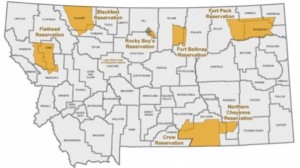
By Transmission & Distribution World Magazine
Secretary of the Interior Sally Jewell has announced that $3.2 million has been awarded to 21 tribal projects to assist in developing energy and mineral resources, including $655,000 to the Crow Tribe to advance a hydroelectric project that will provide low-cost clean power to tribal members and encourage business on Crow lands.
Secretary Jewell, who serves as Chair of the White House Council on Native American Affairs, announced the grants during a visit to the Crow Reservation in southeastern Montana. Jewell was joined by Senator Jon Tester, the new chairman of the Senate Indian Affairs Committee, and Principal Deputy Assistant Secretary for Indian Affairs Larry Roberts.
Jewell is making a three-day visit to Montana, meeting with tribal and business leaders, ranchers, hunters and anglers and other stakeholder groups to discuss the economic value of public lands to local communities, the importance of the Land and Water Conservation Fund in expanding access to hunting and fishing areas, and public-private partnerships that protect public lands, such as the Blackfoot Challenge for the southern part of the Crown of the Continent ecosystem.
The $655,000 grant to the Crow Tribe will allow completion of all technical, environmental, engineering and economic analyses required for an 8 to 12 megawatt hydroelectric project at the Yellowtail Afterbay Dam on the Crow Reservation. This will allow the Tribe to seek power purchase agreements and financing to build the facility, which will provide electricity to its members and invite industry to the reservation with the certainty of reliable, sustainable and clean low-cost power. The project is also expected to improve the Big Horn River’s downstream fishery by reducing excessive nitrogen and oxygen levels.
In 2009, Senator Tester introduced and then successfully helped pass the Crow Tribe Water Settlement Act that authorized the Crow to develop hydropower at the dam.
As Chair of the White House Council on Native American Affairs, Secretary Jewell leads a comprehensive Federal initiative to work more collaboratively and effectively with Tribes to advance their economic and social priorities. Informed by consultation with the Tribes and reflective of tribal priorities, the Interior Department’s FY2015 budget requests $2.6 billion for Indian Affairs, $33.6 million above the 2014 enacted level, to sustain the President’s commitment and honor Interior’s trust responsibilities to the 566 federally recognized American Indian and Alaska Native Tribes.
Recognizing this commitment to tribal self-governance and self-determination, the budget fully funds contract support costs that Tribes incur as managers of the programs serving Native Americans.
A full list of the 21 projects receiving grant awards for energy and mineral development is available here and includes six for mineral extraction, two for oil and gas production and 13 for renewable energy, including wind, hydropower, geothermal and biomass proposals.
Funding for construction of the Crow hydropower project was authorized in the Crow Water Rights Settlement that President Obama signed on Dec. 8, 2010. In March 2011 Crow tribal members voted to ratify the Settlement legislation and the Crow Tribe-Montana Water Rights Compact. The Settlement legislation provided the Tribe with the authority to develop hydropower at Yellowtail Afterbay Dam along with some funding to assist in the development along with other energy development on the Reservation. The Grant announced today is an additional and needed boost to the Tribe as it works to develop hydropower.
Together, the Settlement Act and the Compact quantified the Tribe’s water rights and authorized funding of $131.8 million for the rehabilitation and improvement of the Crow Irrigation Project and $246.4 million for the design and construction of a Municipal, Rural and Industrial (MR&I) water system to serve numerous reservation communities.
The Crow Reservation is the largest of seven Indian reservations in Montana, encompassing 2.3 million acres and home to 13,000 enrolled Crow tribal members.
